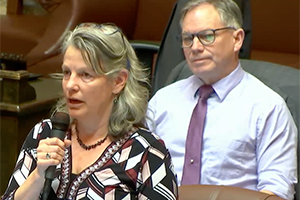Published Tuesday, February 13, 2024 at The Stand
House Approves Unemployment Benefits for Strikers
Rep. Doglio's HB 1893 passes 53-44; benefits limited to four weeks

OLYMPIA (Feb. 13, 2024) — After receiving thousands of emails, phone calls and personal visits in support of its passage, Washington state representatives voted 53-44 to approve HB 1893 to allow striking workers to receive limited unemployment insurance benefits. Its passage keeps the legislation alive after today's cutoff deadline for bills to pass their houses of origin.
The vote occurred after 2 a.m. after a lengthy debate and consideration of multiple amendments. Among the changes that were approved:
● The length of time striking workers can receive benefits was limited to four weeks. The underlying bill already requires a 14-day waiting period before strikers can apply for benefits.
● The cost of the benefits will be charged to the employer's experience rating to avoid those costs being socialized into the system.
"It's time to level the playing field for our workers that make out economy work," said Rep. Beth Doglio (D-Olympia), the bill's prime sponsor, during floor debate. "I ask for you to join me in helping to do just a little bit to help workers protect their families when they are on strike."
The final vote on HB 1893 was 53-44. It now advances to the Senate for consideration.HB 1893 and its Senate companion bill, SB 5777 sponsored by Sen. Karen Keiser (D-Des Moines), are among the priority bills in the Washington State Labor Council's 2024 Legislative Agenda. Here are some excerpts from the WSLC's fact-sheet in support of its passage:
● Workers join together in unions to negotiate for family-supporting wages, safer working conditions, and respect on the job. But some employers refuse to reach contract agreements. Instead, they choose to "starve workers out" by locking them out or forcing a strike. Locked-out workers have access to unemployment insurance benefits in Washington, but striking workers do not.
● Employers' refusal to negotiate is a feature of their bargaining strategy, not a bug. In the recent strike by entertainment industry writers, a studio executive made their strategy clear: "Allow things to drag on until union members start losing their apartments and losing their houses." It is reprehensible that employers build their bargaining strategy around the evictions of employees' families.
● Strikes lasting more than two weeks are rare. BLS data shows only three major strikes since 2009 lasting more than two weeks which could qualify under this bill. Strikes are a last resort, and no one goes on strike lightly. Strikes can also impact earned retirement benefits, health insurance, and prescription drug coverage. Unemployment is a partial wage replacement, and employers are always better able to weather a strike than the workers.
● Washington's unemployment trust fund is in good shape. We have carefully stewarded our trust fund and, unlike other states, did not take out a loan for UI during the pandemic. ESD estimates that this would lead to less than a 1% increase in UI claims during months when a qualifying strike occurs.
● It's cruel to allow workers exercising their right to strike to go hungry, bankrupt, or lose their homes because they are temporarily out of work. And it's cynical to believe that allowing workers to access unemployment benefits will encourage them to go on strike. Workers do not decide to go on strike lightly. When they do, unemployment insurance will simply help their families survive. Only a fair contract can help them thrive.